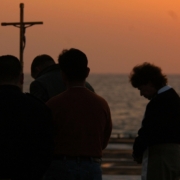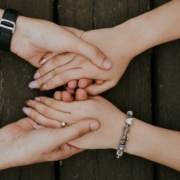From Alcoholism to Sobriety Advocate, Justine Whitchurch Offers Hope for Addiction
By: Laura Bennett
When you’re in a cycle of addiction, the hope of ever breaking free can feel elusive and distant.
It’s cruel how the disease takes over a life and relentlessly batters a person’s identity and will.
Sobriety advocate and fitness coach Justine Whitchurch knew this all too well. At 39 her addiction to alcohol left her with months to live and kids who couldn’t be trusted into her care.
“My daughter was 9, almost 10 at the time,” Justine said.
Her father wouldn’t leave the kids with her and Justine’s daughter “looked at me with tears in her eyes and said, ‘Mum, I’m scared you’re never going to get better’.
“[Remembering that] is a constant reminder that I can never live that life ever again.”
Having picked up a drink in her teens to soften the blow of a broken heart, Justine’s reliance on alcohol grew throughout adulthood, becoming her “medication” for anxiety and the highs and lows of her expanding music career.
Now at 50, Justine aims to educate people on the pitfalls of relying on alcohol in that way and to help them push back on a culture that normalises – and almost celebrates – unhealthy consumption.
“[Drinking] is such a socially accepted means of coping,” Justine said.
“It’s our first fix for anything that’s slightly overwhelming.

“Yes, when we drink alcohol there’s a short-term numbing of that anxious state that we’re in but, chemically and physiologically, after a period of time you’re going to be more anxious because that’s what this drug does,” Justine said.
Looking back on how alcohol addiction affected decades of her life Justine sees “a real loss of self during that time”.
“As a teen and early adult, I was very courageous I think. I had the underlying mental health stuff going on, but I had a real sense of passion and purpose [but] the more I had an inclination to drink, or the stronger my relationship to alcohol got, it took away a lot of that empowerment,” she said.
“I had no direct connection with myself anymore, I’d say I was just surviving.”
Justine credits rehab, intentional routine and “God’s intervention” for her ability to find a path through her addiction, but stresses that, “just because I put down the glass doesn’t mean my life instantly got better”.
“I had a lot of work to do. The difference is when you’re doing it sober you have clarity, you’re much more logical in how you approach things,” she said.
“Me being sober doesn’t stop life’s challenges from coming my way. It’s given me a lot better capacity to cope with what does come my way.”
Article supplied with thanks to Hope Media.
All images: Justine Whitchurch Facebook
About the Author: Laura Bennett is a media professional, broadcaster and writer from Sydney, Australia.




